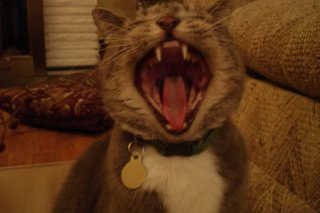 I was trying to get a "festive" photo of the cat but she refused to participate. Antique bells on red rope -- she would have none of it. Instead I got this shot of my fierce jungle tigress 'sounding her barbaric YAWP over the rooftops of the world'. (Points to anyone who correctly identifies the quote, double points if you get the non-movie reference as well.) I took this as a sign that the photoshoot was decidedly over. 'Nuff said.
I was trying to get a "festive" photo of the cat but she refused to participate. Antique bells on red rope -- she would have none of it. Instead I got this shot of my fierce jungle tigress 'sounding her barbaric YAWP over the rooftops of the world'. (Points to anyone who correctly identifies the quote, double points if you get the non-movie reference as well.) I took this as a sign that the photoshoot was decidedly over. 'Nuff said.In other wanderings, today I came across an interesting article about a professor who tried to prove Wikipedia was fallible. He failed. In his experiment he added erroneous factoids to several obscure articles. He expected them to last several weeks, but all 13 were gone in 3 hours. The professor conceded that the system clearly worked. Colleagues however were less convinced.
One quote really struck me, "But doubters of the approach -- and in academe, there are many -- say Wikipedia devalues the notion of expertise itself." Are these professional academics really saying that knowledge has no value in itself? Are they claiming that expertise only matters if I have it and you don't? How can knowledge lose value by being shared? Surely the only useless knowledge is that which is hoarded and kept private.
I wonder if they're speaking out of fear? Do they think that Wikipedia will one day replace the universities (they way the naysayers predicted television, or the internet for that matter, would wipe books from the face of the earth)? I can't understand teachers that root for less information, less knowledge. It's such an ignorant position.


4 comments:
hello Claire,
Rachel has been pining for a ferocious beastie of our own lately, but alas, our rental arrangements and our potential instability job-wise make it not an option. So, we shall enjoy your cat vicariously. I have no idea if I spelled that word correctly, it looks like some form of jovial parson.
I would like to counter your point, Claire, jsut for fun if for no other reason:
Perhaps there is something to be said for not having the information first hand.
Here is my example: if I am trying to put up a mortgage to buy my first home, what would be the best way of doing that? If I were simply to look it up online, any one of a number of problems could happen.
I could find simply the latest trend, or the most popular option, or outdated information that worked last year but not this one, or options that don't apply to my area/country, or information with a disinctive commercial slant. Even worse, there might be excellent websites out there, but who controls which one comes up on my browser? Who knows where to find the best information for me? Hopefully, the experts do.
Beyond that, information of this kind might be readily accessible but what if I cannot understand it? I may make the mistake of just skimming off the easy details or misinterpreting the subtleties of the information.
Perhaps the quote is not saying that expertise will actually be valueless, but simply that it will no longer be valued. And that is a scary thing indeed.
Let me know what you think.
Dave - you raise a very interesting perspective, would so much shared knowledge lead to a devaluing of the concept of expertise.
For me, in the Wikipedia example, I don't think it does because it's still one specific resource that has value because of the way it is edited -- the group expertise -- and not just all information on the same level (ie the rest of the internet).
Ohhh auntie Claire.
How was the meeting?? (I mean..how'd the essay go?) =D
I myself choose NOT to use wikipedia, for different (and somewhat random and completely irrelivant reasons)
Anyways. It raises some interesting questions. I'm going to go meditate on those now.
see you ....CHRISTMAS EVE!
(I remembered the lady's name..it was CLAIRE!)
Love you lots and lots and lots and lots...and you get the picture!
=)
Post a Comment